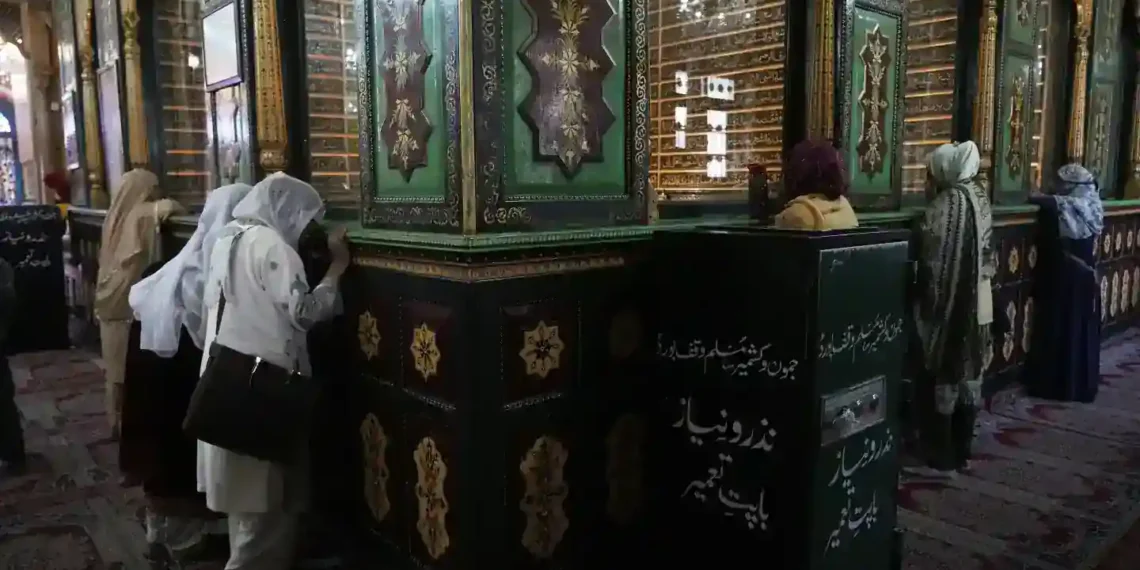India’s Parliament Debates Controversial Bill on Muslim Land Endowments
India’s parliament is in the midst of a heated debate over a controversial proposal by Prime Minister Narendra Modi’s Hindu nationalist government. The proposed bill aims to amend the laws governing Muslim land endowments, known as waqfs, and has sparked intense discussions across the country.
On Wednesday, the Waqf Amendment Bill was introduced by Minority Affairs Minister Kiren Rijiju. The bill seeks to introduce non-Muslims onto the boards that manage waqf land endowments and increase the government’s oversight on validating their holdings. The government claims that these changes will help address corruption and mismanagement while fostering greater diversity. However, critics fear the bill could lead to the erosion of Muslim minority rights and potentially allow the state to seize historic mosques and other properties under waqf management.
The bill would reform the 1995 Waqf Act, which established rules for these charitable foundations and set up state-level boards to manage them. A major part of the proposed reform is the inclusion of non-Muslims on waqf boards, which has sparked strong opposition. Critics argue that this move is politically motivated and could undermine the autonomy of Muslim-managed properties.
The debate is set to be intense, with opposition parties, particularly the Congress-led coalition, voicing their strong opposition to the bill. The ruling Bharatiya Janata Party (BJP) does not have an outright majority in parliament but is expected to rely on allies to push the bill through. If the bill is passed in the Lower House, it must still clear the Upper House before being sent to President Droupadi Murmu for her approval.
Many Muslim organizations, alongside opposition leaders, argue that the bill is discriminatory and politically charged. They believe it is a deliberate attempt to weaken the rights of India’s Muslim minority.
A waqf is an Islamic charitable foundation where a donor sets aside property, often land or real estate, for religious or charitable purposes. In India, waqfs control an estimated 872,000 properties spanning 405,000 hectares of land, worth an estimated $14.22 billion. These properties, which include mosques, seminaries, orphanages, and graveyards, have been in place for centuries.
Currently, waqf boards are composed primarily of Muslims, tasked with managing these properties in accordance with Islamic law. However, the proposed bill would mandate that non-Muslims be included in the boards, a change that critics argue could undermine the religious and cultural integrity of these properties.
One of the most contentious aspects of the bill is the change in ownership rules. Many waqf properties, particularly historic mosques and shrines, lack formal documentation, as they were donated generations, or even centuries, ago. The new law would require waqf boards to seek approval from district-level officers to validate their claims to these properties, which some fear could open the door for challenges to the ownership of these historic sites.
In the context of rising tensions between Hindu and Muslim communities, particularly with radical Hindu groups claiming that some mosques were built on the ruins of ancient Hindu temples, this amendment has raised significant concerns. Critics worry that it could lead to the seizure of valuable land and properties from Muslim communities, further exacerbating religious tensions.
While many Muslims acknowledge the issues of corruption and mismanagement within the waqf system, there is widespread fear that the new law would allow the government to exert greater control over Muslim religious properties. This concern is amplified by the growing climate of hostility towards Muslims in India, especially under Modi’s leadership. Reports of violence and discrimination against Muslims have become more frequent, with the community facing increased scrutiny over everything from food choices to interfaith marriages.
The U.S. Commission on International Religious Freedom recently expressed alarm over the deterioration of religious freedom in India, citing the propagation of anti-Muslim rhetoric by Modi’s government. The report emphasized that Muslims in India, who make up 14% of the population, are among the poorest and most marginalized groups in the country.
As the debate continues in parliament, the future of the Waqf Amendment Bill hangs in the balance. If passed, it could significantly alter the management of Muslim religious endowments in India, giving the government increased oversight and potentially shifting the balance of power in favor of non-Muslim stakeholders. However, the strong opposition from Muslim groups and opposition parties suggests that this will be a tough battle, and the outcome remains uncertain.
This controversial bill reflects the broader tensions in India between the Hindu nationalist government and the country’s Muslim minority. The coming days will be critical in determining whether this proposal will pass and what its impact will be on India’s religious landscape.
This article was rewritten by JournosNews.com based on verified reporting from trusted sources. The content has been independently reviewed, fact-checked, and edited for accuracy, neutrality, tone, and global readability in accordance with Google News and AdSense standards.
All opinions, quotes, or statements from contributors, experts, or sourced organizations do not necessarily reflect the views of JournosNews.com. JournosNews.com maintains full editorial independence from any external funders, sponsors, or organizations.
Stay informed with JournosNews.com — your trusted source for verified global reporting and in-depth analysis. Follow us on Google News, BlueSky, and X for real-time updates.













